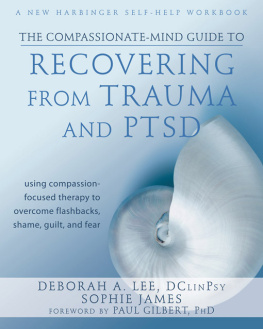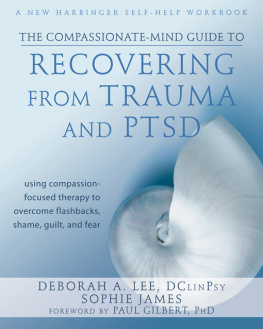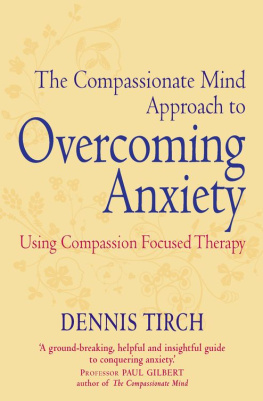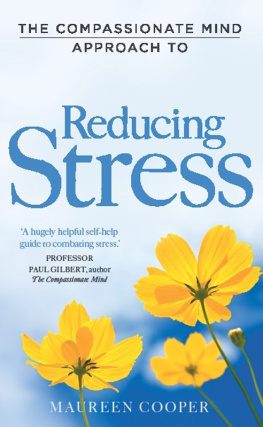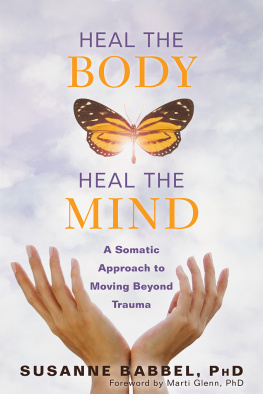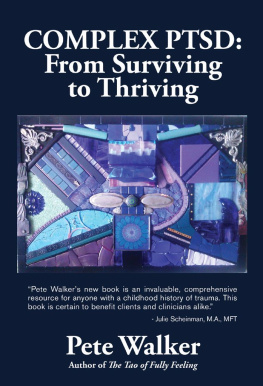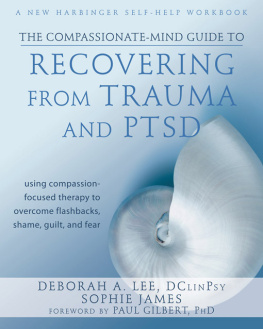Deborah Lee with Sophie James - The Compassionate Mind Approach to Recovering from Trauma
Here you can read online Deborah Lee with Sophie James - The Compassionate Mind Approach to Recovering from Trauma full text of the book (entire story) in english for free. Download pdf and epub, get meaning, cover and reviews about this ebook. year: 2012, publisher: Robinson Publishing, genre: Religion. Description of the work, (preface) as well as reviews are available. Best literature library LitArk.com created for fans of good reading and offers a wide selection of genres:
Romance novel
Science fiction
Adventure
Detective
Science
History
Home and family
Prose
Art
Politics
Computer
Non-fiction
Religion
Business
Children
Humor
Choose a favorite category and find really read worthwhile books. Enjoy immersion in the world of imagination, feel the emotions of the characters or learn something new for yourself, make an fascinating discovery.
- Book:The Compassionate Mind Approach to Recovering from Trauma
- Author:
- Publisher:Robinson Publishing
- Genre:
- Year:2012
- Rating:4 / 5
- Favourites:Add to favourites
- Your mark:
- 80
- 1
- 2
- 3
- 4
- 5
The Compassionate Mind Approach to Recovering from Trauma: summary, description and annotation
We offer to read an annotation, description, summary or preface (depends on what the author of the book "The Compassionate Mind Approach to Recovering from Trauma" wrote himself). If you haven't found the necessary information about the book — write in the comments, we will try to find it.
The Compassionate Mind Approach to Recovering from Trauma — read online for free the complete book (whole text) full work
Below is the text of the book, divided by pages. System saving the place of the last page read, allows you to conveniently read the book "The Compassionate Mind Approach to Recovering from Trauma" online for free, without having to search again every time where you left off. Put a bookmark, and you can go to the page where you finished reading at any time.
Font size:
Interval:
Bookmark:


Publishers Note
This publication is designed to provide accurate and authoritative information in regard to the subject matter covered. It is sold with the understanding that the publisher is not engaged in rendering psychological, financial, legal, or other professional services. If expert assistance or counseling is needed, the services of a competent professional should be sought.
Copyright 2011 by Deborah Lee New Harbinger Publications, Inc.
5674 Shattuck Avenue
Oakland, CA 94609
www.newharbinger.com
Cover design by Amy Shoup; Acquired by Tesilya Hanauer
All Rights Reserved
Epub ISBN: 9781608828630
Distributed in Canada by Raincoast Books
Library of Congress Cataloging-in-Publication Data
Lee, Deborah A., 1955
The compassionate-mind guide to recovering from trauma and PTSD : using compassion-focused therapy to overcome flashbacks, shame, guilt, and fear / Deborah A. Lee and Sophie James.
p. cm. -- (The New Harbinger compassion-focused therapy series)
Includes bibliographical references.
ISBN 978-1-57224-975-2 (alk. paper)
1. Post-traumatic stress disorder--Treatment. 2. Emotion-focused therapy. 3. Compassion. I. James, Sophie. II. Title.
RC552.P67L393 2013
616.85210651--dc23
2012029440
It is, quite frankly, a privilege to thank many people for their inspiration, support, and contribution to this book. But I want to start with my patients because without them I would not have been able to develop these ideas and others would not have benefited from them. So I offer a huge thank-you to you all for your courageous commitment to your recovery and for working with me and offering me insights into your struggles. Over my twenty years of working in trauma as a clinical psychologist, you have helped me develop my clinical ideas about how to use compassion-focused therapy to help people accept and move on from their traumatic experiences. I sincerely hope you are all well and using your compassionate minds!
Some of you have given up extra time to contribute to research projects that look at the effectiveness of using compassion with traumatized people, and I am most grateful to you for taking part. Being able to demonstrate that this approach actually makes a difference to how people feel helps me to continue to develop my ideas.
Undoubtedly my clinical and professional career would have developed in a different way had I not had the pleasure of working with Professor Paul Gilbert, Series Editor, over the last twelve years and I certainly would not have had the opportunity to write this book. So I am indebted to Paul for his inspiration, encouragement, and abundant generosity on both a professional and a personal level, and for introducing me to compassion-focused therapy and offering me the opportunity to contribute to its development. My clinical work has been immeasurably enhanced by his theoretical ideas and clinical practice, and I am extremely grateful for that.
I have also known my colleagues in the Compassionate Mind Foundation for many years, and they too have contributed to many fun and inspiring times as I have developed my clinical practice of compassion-focused therapy. Warm thanks to you all.
I have had many professional colleagues over the years who also work in the field of trauma and they have encouraged me to develop these ideas. I am most grateful to Carmen Chan, who has diligently helped me develop the compassion-focused group that we run in our service and on which this book is based, and to Laura Bowyer for her contribution to some of the exercises.
On a personal note, I want to thank and offer my love to my family for allowing me the space and time to complete this book. My husband, Andrew, and my children, Iona and Dulcie, have graciously put up with 5:00 a.m. writing fests and hijacked weekends and holidays to allow me to complete this project. May love and compassion always fill your lives.
Finally I want to thank Sophie, my sister-in-law, who agreed to embark on this project with me, keep me on task, help me translate my ideas into lay language, and correct my appalling grammar. You deserve a big thank-you, as I am sure you had no idea what you were getting yourself into when you said yes.
Deborah
Thank you, Deborah, for inviting me to help you with this project. It has been a great opportunity for me and I have relished and enjoyed both the writing and our working together. Thanks also to Paul Gilbert for his helpful comments. Finally to Nick, Mum, and Gay, I want to offer love and thanks to you all; I couldnt have finished this book without your help, love, and support.
Sophie
And to everyone who reads it, we hope you find the book helpful and we dedicate it to you.
May your compassion always be with you.
We have always understood that compassion is very important for our well-being. If we are stressed or upset, it is always better to have kind, helpful, and supportive people around rather than critical, rejecting, or uninterested folk. However, it is not only this common sense that tells us about the value of kindness and compassion; recent advances in scientific studies of compassion and kindness have greatly advanced our understanding of how compassionate qualities of the mind really do influence our brains, bodies, and social relationships, as well as affect our health and well-being. Compassion can be especially important when we are faced with major stresses and traumas. At these times we can find ourselves going numb, having flashbacks and intrusions, and experiencing a change in our normal sense of self and in our emotions.
Our susceptibility to these difficult reactions to traumatic events is due in part to the way the brain processes them. In this landmark book, Dr. Deborah Lee explores many of the common symptoms that are associated with trauma, such as flashbacks and intrusions and at times a changed sense of reality and feelingsometimes linked to whats called dissociationand how these symptoms are related to the way our brains may be working. Not uncommonly we can ruminate on the trauma and wonder why it happened to us. We can become sensitive to small triggers from sights, smells, or sounds, which can reactivate very unpleasant trauma memories and feelings. Because we struggle at times to fathom whats going on in our minds, or to deal with the intrusions or change of feelings, we can become self-critical, which compounds our sense of threat and difficulties in healing our traumatic experiences. Not only might we feel self-critical about how we are trying to cope with the trauma, we might feel critical and ashamed about the events surrounding the trauma. We can get locked into self-accusatory spirals, feeling that our sense of self has been changed by the trauma.
So why are we so susceptible to having these very disturbing experiences that can last long after the trauma has passed? Dr. Lee uses her wealth of knowledge and experience in working with traumatized people to guide our understanding and help us recognize that actually many of our emotions and the ways we react to frightening events are the result of a very long evolutionary history. We share with other animals capacities for certain emotions such as fear, anxiety, terror, anger, and frustration. Where we differ from other animals is that we have brains that are capable of extraordinary feats of memory and of analyzing ourselves and our environment. Whereas, for example, if a zebra or an antelope is chased by a lion, after it has made its escape it will usually settle down and go back to eating. It is unlikely to ruminate on the event, to wonder why it happened to it or if it could have avoided it by behaving better, or to ponder the implications for its future. The animal probably wont dwell on what could have happened if it had been caught and entertain horrible fantasies of being eaten. If it suffers from flashbacks of the lion attack, then again its unlikely to ruminate about these, what they mean, and how it can stop them. Of course, we know that animals can be traumatized too and become very anxious or aggressive; people who give homes to these rescued animals will understand this reality very well. Equally, we know that a supportive, kind, and calming environment is what is needed for animals to heal from trauma. If this is true for animals, then it is certainly true for us as well.
Font size:
Interval:
Bookmark:
Similar books «The Compassionate Mind Approach to Recovering from Trauma»
Look at similar books to The Compassionate Mind Approach to Recovering from Trauma. We have selected literature similar in name and meaning in the hope of providing readers with more options to find new, interesting, not yet read works.
Discussion, reviews of the book The Compassionate Mind Approach to Recovering from Trauma and just readers' own opinions. Leave your comments, write what you think about the work, its meaning or the main characters. Specify what exactly you liked and what you didn't like, and why you think so.

